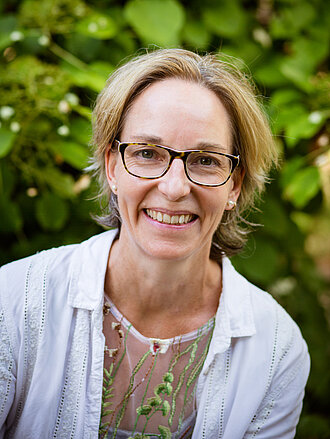Prof. Sabine Schmidt-Lauff

What excites you about adult learning and education?
"The diversity, heterogeneity, inconsistency and ever-changing tasks that practice, science and politics - with the goal of 'education for all adults' - meet accordingly, are a great challenge and at the same time the fascinating thing about adult education for me. It is about cultivating human learning over the longest phase of life (50 and more years of adulthood). As a universal human right, this is a call to ensure that spaces and times are created, defended and preserved in which adults have the opportunity to pursue their learning and educational interests, and indeed to develop them in the first place."
Why did you choose to do research in the field of adult learning and education?
"For me, 'adult education' also includes a variety of quite controversial approaches about the role of (lifelong and lifewide) learning in this rapidly changing world, which is fundamentally critical of modern, optimizing interpretations of a functional self-regulated learning. The (German) concept of BILDUNG is part of a democratic tradition, too, which - we see this more than ever at present - is characterized by very fragile relationships between subject and society, individual and world, self and structure, politics and opinion. If I were to name my 'favorite', very own research focus, it is time and the meaning of temporal phenomena in the context of adult learning. TIME FOR LEARNING! In the preoccupation with the (professional) cultivation of learning, time plays such a significant and fundamental role that it is, in my view, incomprehensible how it can be repeatedly overlooked. The research of time-related educational science is so helpfull to connect across disciplines as well as across national borders. It opens doors into the future ... worldwide!"
Sabine Schmidt-Lauff holds the Professorship for Continuing Education and Lifelong Learningat Helmut-Schmidt University of Hamburg since September 2016. Since 2020, she since has been a member of the Senate Committee for International Affairs (Senatsausschuss für Internationales) of the HSU. She is a member of the German Society for Educational Sciences (Deutsche Gesellschaft für Erziehungswissenschaften DGfE), Adult Education Section and was Chairperson of the Board from 2010 to 2014. She was Guestlecturer and Sub-Coordinator of the Autumn School in the framework programme Indian and European Insights of the German Academic Exchange Service (DAAD). She has also been involved in the previous ERASMUS+ COMPALL (Comparative Studies in Adult Education and Lifelong Learning; (2015 - 2018) and INTALL (International and Comparative Studies for Students and Practitioners in Adult Education and Lifelong Learning; 2018 - 2021) Strategic Partnerships. She is a
reviewer for the DFG (German Research Foundation) and the Alexander von Humboldt Foundation.
- international-comparative research on lifelong learning
- time and temporalities in (adult) eduaction and learning
- digitisation and AI in higher education and adult learning
- professionalisation, professionalism and professional identity in adult education
CG13: Exploring Time and Temporal Patterns in Adult Education
Co-Moderators: Prof. Miriam Douglas & Dr. Jörg Schwarz
Time is inextricably intertwined with human existence and our experience. Temporality – a more neutral yet multifaceted concept – is widely regarded as a constitutive dimension of all human action and being. Time functions not only as a quantitative measure for describing physical phenomena (motion in place and substance), but also, akin to space, as a categorical framework through which relational aspects of sociality and individuality are constructed. "Time," as Immanuel Kant stated, "is a necessary concept that underlies all our perceptions." (Kant KrV B 52). Learning as action in time. Learning invariably unfolds over time (a) In a chronometric sense (‚learning always takes time‘), and (b) situated within various phases of the lifespan in a chronological sense (‚learning to become a parent‘). Furthermore, educational theories and concepts are inherently embedded within historical contexts. For instance, the notion of lifelong learning has emerged as a modern imperative in response to the accelerated transformations characteristic of contemporary society and the broader narrative of modernization (‚learning towards the future‘). However, these cultural assumptions on the relations between time and learning have become institutionalized in educational legislations (Paid Educational Leave), organisations and programs (informal learning on demand) and thus fundamentally shape the ways of adult educational practice. This comparative group will research the patterns of learning time inscribed in the institutions of national adult education systems, focusing on the level of national / regional laws, organizational processes and program structures. By comparing these patterns, we will be able to highlight different cultural assumptions on the relation between time an learning in adulthood and at the same time, we will become more sensitive for the peculiar temporal qualities lying within them. This sensitivity may also be seen as a “professional time sensitivity” (Schmidt-Lauff & Bergamini, 2017) thus enriching our professional capacities as adult educators.
-
SCHMIDT-LAUFF, S. (2025). Is it all about time? The question(s) of temporality in adult learning. EPALE Blog-Post, https://epale.ec.europa.eu/en/blog/it-all-about-time-questions-temporality-adult-learning
-
SCHMIDT-LAUFF, S. (2023). Learning and Teaching in Higher Education in Post-Covid Times: A Digital Transformation. In. Vanna Boffo & Regina Egetenmeyer (eds.). Re-thinking Adult Education Research. Beyond the Pandemic, pp. 251-163. Firenze University Press (Italy), https://doi.org/10.36253/979-12-215-0151-3.23
- SCHMIDT-LAUFF, S. (2023). Time and Temporalities in (Adult) Education and Learning. Sisyphus Journal on Education, Vol. 11 No. 1, S. 6-9. https://doi.org/10.25749/sis.29952
- SCHMIDT-LAUFF, S./ BREITSCHWERDT, L./ SCHWARZ, J. (2023). Global Challenges need Global Perspectives - Comparative Research on Adult Education. In Lisa Breitschwerdt, Jörg Schwarz & Sabine Schmidt-Lauff (Hg.) (2023). Comparative Research in Adult Education: Global Perspectives on Participation, Sustainability and Digitalisation, pp. 11-28. Bielefeld: wbv Publikation. https://dx.doi.org/10.3278/9783763971336
-
5. ALVES, N./ SCHMIDT-LAUFF, S./ DOUTOR, C./ CAMPOS, L. (2020): Contexts of Recognition of Prior Learning. A comparative study of RPL initiatives in Brazil, Portugal, and Germany. In. Despotovic, M. & Popovic, K. (eds.). Andragoske studije/Andrago ical Studies, (2)2021 – Articles. Open Access: [15.06.2021] file:///C:/Users/schmidts/AppData/Local/Temp/AS_2020-2_04.pdf


